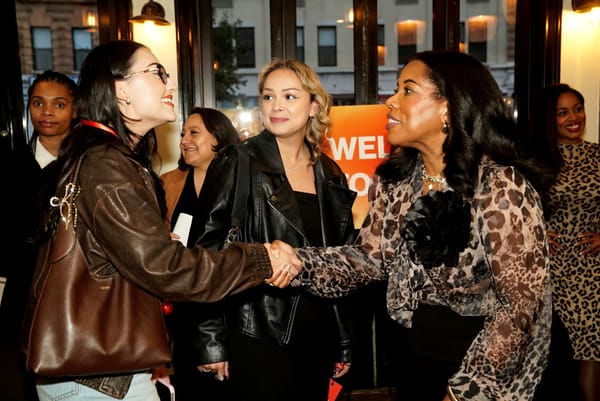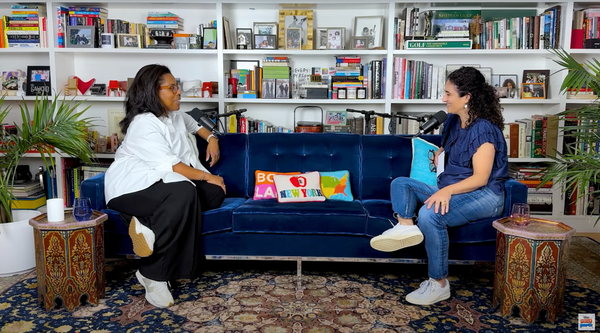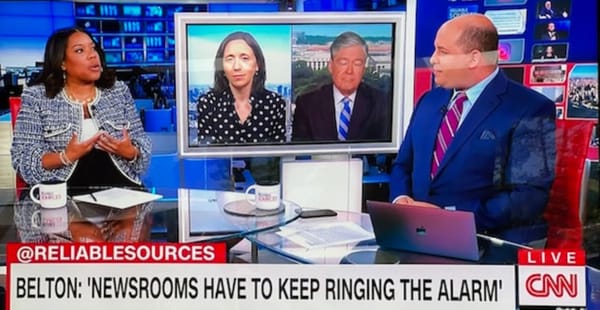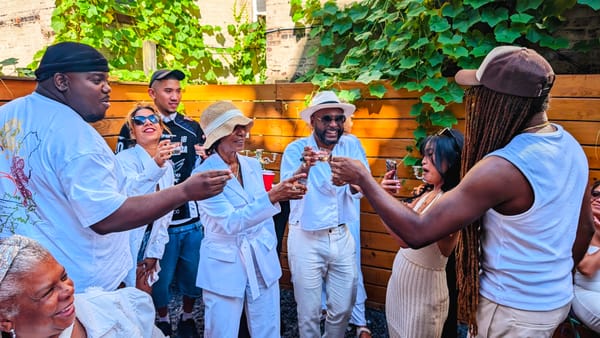Every Year In Journalism Is A Marathon Where Towards the End I Can Barely Walk
Yet somehow, I still cross the finish line.
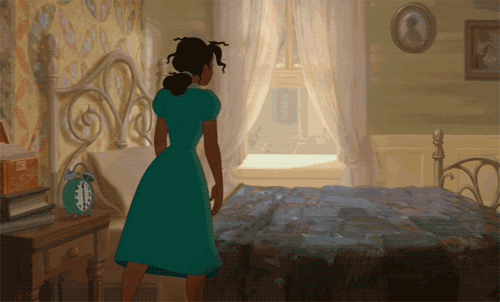
Between potential media mergers that sound more like abominations than good ideas and a tough digital landscape that saw more casualties than wins, I feel like the entire media/news/entertainment industry is riding deep on the struggle bus after a tough 2023.
Some of it was because of the dual Hollywood strikes and losses in the streaming wars, but a lot of it was from declining revenue from a recession that never quite emerged. Yet, somehow every corporation tightened their advertising budgets anyway, leading to digital news crisis after crisis as the revenue model fell apart and most free news outlets went with it. I’m proud of the fact that HuffPost is doing well despite industry headwinds, and declines in social media with Facebook deprioritizing news and Twitter/X imploding. We have a growing audience, a popular homepage, and tons of talented, award-winning journalists — all of whom I’m grateful for.
The Substack of the Writer Formally Known As The Black Snob is a free publication. To receive new posts and support my work, consider becoming a subscriber.
But 2023 thoroughly kicked my ass, as has nearly every year I’ve worked in journalism since I entered the field 23 years ago in 2000.
But none of this is new. You could argue the revenue model for journalism has been in shambles since the mid-2000s when magazines and other print publications started collapsing.
Recently, as part of my work on my book, I reached out to several of my old editors and co-workers from my five-year stint at The Bakersfield Californian newspaper. At the time, when I worked there from 2002 until 2007, it was a small, but mighty family-owned paper, still doing quite well thanks to a robust classified section and its early adoption of the internet. The then-executive editor was Mike Jenner, who is now a professor at the University of Missouri, the j-school I should have probably gone to but my mommy wouldn’t let me.*
*It’s a long story that begins with arguing over spending $20 on college applications and paranoia, and ends with fears of racism, which is wild since I ended up going to undergrad in southern Illinois, a known hotbed for the KKK.
The journalism we did in Bakersfield during that time was quite impactful on the community, uncovering corruption and government malfeasance. It was the only time I ever got to work in a large, traditional newsroom — an experience I still pine for to this very day. (Most of the digital sites I’ve worked for haven’t had traditional newsrooms save for the former Gizmodo Media Group sites I worked for as editor-in-chief of The Root, and HuffPost is now a remote/hybrid newsroom thanks to the pandemic.)
In Bakersfield, I gained a reputation as a popular, versatile writer who would work on one of the biggest mass homicide stories of that period, back when I was a general assignment reporter. I often tagged along with veteran crime reporter, Steve Swenson, and my good, long-time friend who left journalism to become an Episcopalian priest, Christina Vance. At the time, she was the then-night crime reporter. I did everything at The Californian, from drawing illustrations to education reporting to writing humor columns. I would later take over the entertainment beat, where I had The Californian’s first ever “blog” in 2004 on the old, original blog site, Blogger.
But once ol’ Craigslist came to town, it was a precipitous decline, as it was for all local newspapers, with revenue drying up as the once lucrative small ads moved to free services online.
Because I’m either too dumb to quit journalism or an uber genius who cracked the code on how to survive in this volatile industry, I gave up on my childhood dream of being the Black female Dave Barry with occasional Bill Watterson-style doodles and did what my artistic and analytic father did before me — leave something I loved and was quite good at (in his case it was being a talented engineer in the aerospace industry and in my case — writing) to go into management because … money.
Thankfully, like my father before me, I had a knack and love for people managing, although I’m a bit more of a passionate people person than the omnivert who raised me.
Today, management in media is not as glamorous as what it was to be a syndicated newspaper columnist or cartoonist back in the 90s. Here was teenage me, admiring Vanity Fair’s Dominick Dunne and NYT’s Maureen Dowd at the height of their influence and powers, with their expense accounts and fancy parties in New York and LA, thinking this would be a viable path for me. “Yes,” young me thought, “I’m good enough to be in every newspaper and magazine in America! I just have to pay my dues and climb my way up to the top!” only for print media to croak on me shortly after I graduated from Southern Illinois University Edwardsville in 1999.
It didn’t matter that all the biggest names in this game who were not Clarence Page or Eugene Robinson, were typically white. I just figured, hell, I could be the first Black woman to pull a Molly Ivins and be the Oprah of opinion pieces.
To my professors’ credit, they warned me that the internet was going to kill my chosen profession and my columnist dreams. Former SIUE professor Riley Maynard used to tell us that most of us wouldn’t make it and would end up accountants or lawyers or anything but journalists. Well, he said that to everyone but me as I was almost certain, even then, he was not talking about me. I was the editor-in-chief for two years, running the student newspaper, the Alestle, and the winner of the Bob Hardy scholarship. I was a big fish news nerd who excelled in the small pond of SIUE. And failure wasn’t an option for me. It was either “go big as a writer or go home,” literally, which I did in humiliation twice in my career, first in 2007 and again in 2013. I still remember telling my academic advisor, professor, and then-department chair, Patrick D. Murphy, of my then-dream of working for CBS News’ flagship news magazine, 60 Minutes, and rather than tell me I was completely delusional and to aim a little lower, he told me he felt I could do it.
I chose print over TV so 60 Minutes never happened (yet!), as my TV career was thwarted in 2000 when a local news station recruiting me out of Idaho told me not to worry because “the white supremacists are way north of here.” I chose to pursue a job at the Midland Reporter-Telegram instead where then-editor Meta Minton had the good sense to not mention Midland’s own problems with racism, and the rest was history.
When I tell you that this profession has kicked my ass so many times, I’m really telling you that I’m amazed we even got to this point, with me writing about my career from the tenuous, precarious security of an EIC gig while artificial intelligence and other media nightmares breathe down my neck. Every year of my career has been under the gun. And I did it all with an at-times crippling mental illness that threatened not just my livelihood, but my very life.
It also didn’t help that I was Black, female, and often quite chubby. But plucky me never let little things like that keep me down. If anything, I thought they were assets because they made me more empathetic, creative, resilient, and intuitive. I love being a Black woman (chubby … not so much, but that’s something I’ve been working on since high school), and while the occasional job didn’t happen because someone didn’t realize Danielle C. Belton of North St. Louis County, Mo., member of historic African-American Greek letter organization Zeta Phi Beta Sorority Inc., was a “Negress” until she went to the job interview, I was grateful those employers showed their misogynoir early so I didn’t have to suffer the indignities of working for virulent, sexist racists. Seriously, thank you for not hiring me as, to paraphrase Alice Walker, until you do right by all people, everything you do is going to fail.
And boy, did these publications fail. Most don’t exist anymore or are completely irrelevant now.
I credit my longevity in this industry as one-third talent/smarts, one-third charm, and one-third healthy delusion. It is a crazy thing to think you’re not only going to survive in this jacked-up business but become editor-in-chief of a Pulitzer-Prize-winning newsroom. None of this was guaranteed. Not when I was in local newspapers. Not when I was a blogger. Definitely not when I was part of the Black press. And not when I was in nonprofits as a social media editor. It wasn’t even promised when I was head writer for a long-defunct, late-night talk show on BET!
And most assuredly not when I was hospitalized not once, not twice but four times for mental illness woes and suicidal ideation.
I credit my old editors, co-workers, and friends at The Californian for saving my life and loving me back when I thought I was unlovable. The incredible support of that newsroom — alongside my family — is why I’m here right now, writing about the dire state of media while still being firmly in the fight.
I’m not going to give up on my dreams. I still love to write, as I write something every day, usually in my journals. I’m almost 95.5 percent positive that at some point in my life I will be a published author under my own name. (I’ve ghostwritten a book or two for others.) And I love leading a newsroom. Even when it’s bad, it’s still pretty good. And I’d rather slug it out with “my people,” who are journalists — the only people who have made sense to me since I entered the Mass Communications program back in 1997 — than be a lawyer like my mother wanted me to be or an accountant like Dr. Maynard threatened my classmates they’d become. It’s a good, crazy life. One I wouldn’t trade for any other. Journalism is constantly changing, challenging, evolving, creative, meaningful, purposeful, and exciting. Plus, you get to know things before everyone else and I’m fairly nosy. If I wasn’t a working journalist, I’d probably be a failed writer or artist, presently folding sweaters at a Macy’s in a dying mall somewhere in St. Louis, as this is what I did when I was a “failed” journalist back in 2008-2009.
I credit my family, especially my sisters, mother, and grandmother, for why I was convinced I was so “special” and thus just kept going no matter what was happening within me or around me. They all saw things in me that I did not see for myself when I was young and my mother in particular worked hard to preserve my self-esteem in the face of the loneliness and childhood bullying that marked most of my formative years. For them, their dreams for me only went in one direction — high and higher. So high that around 2008 or ‘09 I had the most insane conversation with my grandmother, whom we kids called Granny, where she admonished me for not “landing Obama.” This ignored that I was about 16 years his junior and he was married to Michelle when I was in freshman in high school, but the sentiment was there. She was convinced I was going places and thought one of them should be the White House. My mother was a bit more subtle, telling me in hushed tones one day in 1999 during the Clinton impeachment trial that she thought I could be on TV, defending the president like one of his lawyers, a Black woman, Cheryl Mills.
Both my mother and grandmother have since passed on — Mama in 2018 and Granny in 2021, but in 2020, when I got the job at HuffPost, one of the first people I called to celebrate with was my baby sister, Deidre, who screamed with excitement when I told her. Deidre, who watched me deteriorate in my 20s to a nearly unrecognizable state when I was sick with the worst of my Bipolar disorder, knew more than anyone how hard it had been to come back from the depths of that. And we always talk about how neither of us ever wants to return to the struggle of my past.
I’m looking forward to 2024 in journalism even if the industry is in shambles. Even if digital media is suffering. Even if everything seems hard and bleak and a certain former president is threatening revenge upon the free press if he returns to power. Again, I’m either too lucky or too delusional to think otherwise. For some reason, I’m an optimist. For some reason, I think there’s still some hunt left in the old dog or even crazier, that it can learn some new tricks.
I mean, I did it. And it was hard and sucked, but it worked out OK. Maybe 2024 in media can be OK too.
The Substack of the Writer Formally Known As The Black Snob is a free publication. To receive new posts and support my work, consider becoming a subscriber.
